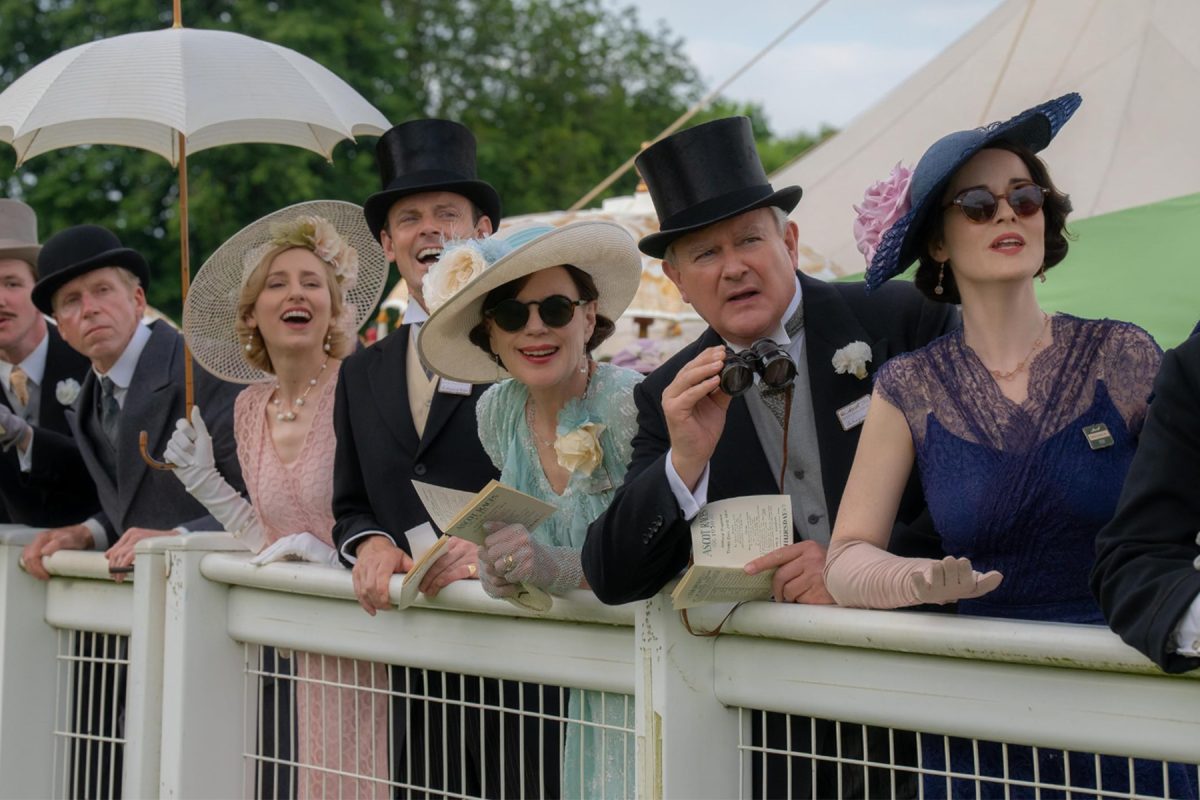“Sometimes I feel the past is a more comfortable place than the future,” Harold Levinson (Paul Giamatti) says at a particularly poignant moment in “Downton Abbey: The Grand Finale.” This comfort in a past slipping further into the rearview is a central dilemma of the final Downton film, just as it has been through six television seasons and two previous films. Each time this bustling future approaches, modernity creeps its way into the aristocratic Crawley family’s Yorkshire estate, introducing new obstacles to overcome.
The film opens with the Crawleys attending a West End performance of the Noël Coward operetta “Bitter Sweet,” starring the dashing Guy Dexter (Dominic West), a recurring character from the previous film and the lover of former Downton butler Thomas Barrow (Robert James-Collier). 1930 England is not kind to these two — their very existence as gay men is a crime. Despite the terribly homophobic thumb under which they live, it is beautiful to finally see Barrow live his life on his own terms.
The world chugs along as Lord Robert and Lady Cora Grantham (Hugh Bonneville and Elizabeth McGovern) go flat hunting in London. While Robert throws a tantrum about not being able to go “up” to bed because there is no “up” at all, the Crawleys’ struggle to adapt to the future becomes apparent: It may leave them and Downton behind.
Robert and Cora’s eldest daughter, Lady Mary Crawley (Michelle Dockery), finds herself in the trenches of high society gossip when news of her divorce finally breaks and she is kicked out of a ball in London, being treated like a pariah by all but her own family. Mary and her parents retreat to Downton Abbey, where Harold, Cora’s brother, arrives with Gus (Alessandro Nivola), a financial advisor who develops an eye for Mary. Once there, the family discovers the deeply disturbing news that Harold has mismanaged his and Cora’s entire estate, leaving them without an inheritance.
Throughout the film, we also see our old cast of characters, both upstairs and downstairs. Daisy (Sophie McShera) is taking over as cook from Mrs. Patmore (Lesley Nicol), and Anna (Joanne Froggat) and Mr. Bates (Brendan Coyle) are expecting a child. The brilliant Isobel Crawley (Penelope Wilton) is engaged in a battle over the traditions of the county fair, but there is something terribly strange about seeing her without her partner in crime, the inimitable Violet Crawley, the Dowager Countess of Grantham (Maggie Smith).
Smith passed away in September 2024, as did her character in the previous film. In her absence, the film feels like a full-on tribute to her brilliance as an actor and her kindness as a human being, personified by the lovingly draconian portrait of Violet hanging in the halls of Downton Abbey. While the dower house is cleared out, we are left with a closeup of her favorite chair. Smith is in every corner of the house, every antique, every sarcastic quip — in fact, in every frame of the film. She is not forgotten. Her character is Downton’s past, and lives on through the family’s future — her granddaughter Mary.
While dense in plot, this grand finale weaves together fulfilling character interactions and satisfying endgames. Everyone gets their time to shine, no matter how brief. This has always been the franchise’s strength: Countless storylines take place at once, but they all converge and wrap up in a fulfilling way. This is much easier to do in a TV series, but writer and series creator Julian Fellowes shows his mastery in intricate plot maneuvering with each new movie. As always, his plots are shouldered by more than capable actors that bring the interpersonal relationships of Downton to life.
Beyond that, the brilliant and signature aesthetic appeal of Downton Abbey is on display in every scene. “The Grand Finale,” like its film and TV predecessors, comes with extravagant costume design, gorgeous sets and a fantastically transportive score. It’s clear that not one penny went to waste in the $50 million budget.
“Downton Abbey: The Grand Finale” is a worthy end to the beloved franchise and grapples with its core questions. As the world of the 20th century rapidly advances, the Crawleys have always had to change with the times. This finale is no different. Led by Mary, the family must prepare for a new age, a poignant reminder that time catches up to all of us and we must do our best to keep pace.
Contact Joe Paladino at [email protected].

























































































































































